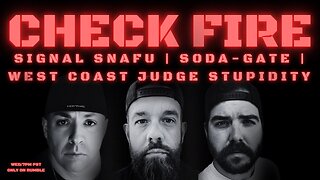Premium Only Content

🚨MEDIA OPENLY QUESTIONS U.S. CONSTITUTION🔔RUREADY?
September is SURVIVAL PREPAREDNESS month
NTL info DUMP
⬇️prepared?⬇️
INTEL DUMP
Ivan Raiklin #MOATF Elon Musk
5hrs.42mins.
[ https://rumble.com/v5dhmqd-ivan-on-fresh-and-fit-podcast.html ]
"No one is safe! Americans need to arm themselves now" ICE agents warn
https://rumble.com/v5djyx1-no-one-is-safe-americans-need-to-arm-themselves-now-ice-agents-warn-redacte.html
America's Enemies Just Made A Huge Move
https://rumble.com/v5dh7xp-americas-enemies-just-made-a-huge-move-ep.-2321-09032024.html
"They are HIDING a massive UFO base in Antarctica" ( NSA 𐃉 ) 🛸
https://rumble.com/v5dk0n9-they-are-hiding-a-massive-ufo-base-in-antarctica-redacted-w-clayton-morris.html
Here we go again.
The Disturbing Reason the CCP & Elites Are Buying US Land w/ Mel K
https://rumble.com/v5di68t-the-disturbing-reason-the-ccp-and-elites-are-buying-us-land-w-mel-k.html
PANDEMIC
As we noted when discussing Kamala Kare, the elites are itching for another pre-election crisis — and Massachusetts may have found one.
The Bay State is enforcing “voluntary” lockdowns to fight Eastern equine encephalitis (EEE). Yes, you read that right — voluntary but enforced, kind of like those "mostly peaceful riots" a while back.
Of course, Massachusetts officials are saying it's “for your safety,” but let’s be honest: this is just the latest chapter in the government’s endless quest for control, using public health as the weapon of choice.
And make no mistake: words are a key part of the strategy, as George Orwell noted many years ago: if you control the language, you control the people.
Is the Cure Worse Than the Disease? Eastern equine encephalitis is serious, sure. But with an average of seven cases in the U.S. each year, is it worth locking people inside? Suddenly, these Massachusetts towns are at “critical risk,” and residents are told to hide indoors from mosquitoes.
Really? It smells like fear-mongering.
Today it’s EEE; tomorrow, it’ll be something else.
source: twc.health
✶
CENSORSHIP
The recent situation involving Starlink and the Brazilian government highlights a complex and concerning intersection of technology, law, and free speech. Elon Musk’s satellite internet company, Starlink, initially resisted a Brazilian Supreme Court order to block access to the social media platform X, also owned by Musk. This resistance was due to the Brazilian authorities freezing Starlink’s financial assets as leverage to enforce compliance with the order. Eventually, Starlink decided to comply with the order to maintain its operational license in Brazil, despite the asset freeze being contested as unlawful by the company.
This incident sets a worrisome precedent for free speech and the operations of foreign companies in sovereign nations. By freezing Starlink’s assets to enforce compliance, the Brazilian government has demonstrated a powerful tool that other countries might emulate to control digital platforms and content. Such actions could encourage governments worldwide to leverage financial and operational pressures to enforce censorship, potentially stifling free speech and innovation.
Elon Musk’s situation illustrates the complexities faced by global tech companies operating in diverse regulatory environments. Despite owning both Starlink and X, Musk found himself in a position where his internet service provider was compelled to censor his social media platform. This highlights the challenges of maintaining operational integrity while adhering to local laws, which may conflict with the company’s or owner’s principles on free speech.
The Brazilian case could serve as a blueprint for other nations seeking to exert control over digital platforms. If governments see that financial leverage can effectively enforce compliance, they might adopt similar tactics, potentially leading to a fragmented internet where content accessibility varies significantly by region. This could undermine the global nature of the internet and lead to increased censorship and control by authoritarian regimes.
The Starlink situation in Brazil underscores the delicate balance between adhering to local laws and upholding principles of free speech. As global tech companies navigate these challenges, the international community must consider the implications of such precedents on the freedom of information and the potential for increased governmental control over digital platforms. The outcome of Starlink’s legal challenges in Brazil will be closely watched, as it may influence future interactions between tech companies and governments worldwide.
Musk has his own internet service provider in Brazil and is being forced to comply with their ban of his own social network on it because they seized his company’s assets. A lot of people are afraid to say this out loud, but I’m not: we’re going to need to build our own parallel government-in-waiting by building parallel infrastructure and institutions now.
source: GAB
10 Ways FEMA Will Brainwash You This Preparedness Month
While we appreciate September as National Preparedness Month, we do not appreciate the advice FEMA shares.
Let’s be clear: Everyone should prepare for emergencies.
If the National Preparedness Month promotions encourage more people to be self-reliant, then excellent!
However, FEMA’s messaging brainwashes people into believing the government will come to save them after a disaster.
Instead of encouraging self-reliance, they encourage government dependence.
And worst of all, they fail!
There are countless stories of FEMA’s failures following disasters. So much so that people now refer to FEMA as Fix Everything, My Ass rather than Federal Emergency Management Agency.
Yikes!
Here are ten examples of ways FEMA misleads people:
1. Have a Three-Day Supply of Food

When you look for emergency preparedness advice, stocking up on food is always at the top of the list.
However, FEMA advises only having a three-day supply of food for emergencies.
While this is better than nothing, you will run out very quickly… and before any FEMA assistance even arrives!
Whether you’re facing a hurricane, wildfire, or earthquake, it’s going to take several days—possibly weeks—for grocery stores to be accessible.
Then, it’s going to take time for the supply chain to recover.
If there is a major power outage along with a natural disaster, the power may be out for a week… or longer.
This is another reason you need more than three days’ worth of food.
Instead, start building up a long-term emergency food pantry that will last your family far beyond three days.
My Patriot Supply’s long-term emergency food is designed to be prepared with only water and can be cooked over a warm fire. No other ingredients necessary!
2. Have a Three-Day Supply of Water

Along with a three-day supply of food, FEMA also advises having a three-day supply of water.
They also recommend having one gallon of water per person per day.
This is not enough!
Water is necessary for survival. You need it to stay hydrated, but you will also need it for sanitation and cooking.
[IMAGE 2]
3. Store Tap Water
Speaking of FEMA’s recommendation of storing three days’ worth of water, they give some crazy advice about how to store this water…
Read this section from FEMA’s Are You Ready Basic Preparedness Guide:
Fill the bottle to the top with regular tap water. If the tap water has been commercially treated from a water utility with chlorine, you do not need to add anything else to the water to keep it clean. […] Tightly close the container using the original cap. Be careful not to contaminate the cap by touching the inside of it with your finger.
Given the reports of how much of America’s tap water is contaminated and the number of cyberattacks on water treatment facilities, you should not be dependent on your tap water.
And these threats are before a natural disaster that may affect your water.
Instead, invest in a water filtration system to ensure your family has access to clean water.
4. Pay Attention to Local Media
This FEMA advice made me laugh aloud when I read it.
“Local authorities may not immediately be able to provide information on what is happening and what you should do. Pay attention to local media outlets for official news and instructions.”
That makes no sense.
You can’t advise people to pay attention to local media outlets when you just told them local authorities may not know what is happening.
It’s wise to have a weather radio to stay tuned during major events, but at the same time, don’t expect local media to come through if SHTF.
[IMAGE 3]
5. Keep Mobile Phones and Electronics Charged Before a Power Outage

In FEMA’s promotional materials about preparing for a power outage, one piece of advice is to “Keep mobile phones and electronic equipment charged before a power outage.”
While the advice is similar to “keep your gas tank full,” what it doesn’t factor in is that power outages may go on for days or weeks.
Even if your phone is fully charged, how are you going to keep it charged?
This is why we recommend having solar-powered charging devices. Once the battery dies on your device, you can charge it using your solar-powered charger.
Additionally, it is worthwhile to invest in a solar-powered generator that serves as a mobile charging unit.
6. Sign Up for FEMA Alerts for Up-to-Date Notifications
On ready.gov—FEMA’s emergency preparedness website—they emphasize being informed by utilizing the FEMA app and signing up for FEMA text messages.
While this is good in theory, there have been numerous reports regarding FEMA’s failure to communicate.
It’s one of the issues they are most known for.
Just take a minute and look at Reddit threads about the different times the FEMA Disaster Assistance System went down.
Knowing what a failure their Disaster Assistance System is does not inspire confidence that they will send you an alert about an incoming threat…
[IMAGE 4]
7. Make a Plan for Refrigerating Medicines and Powering Medical Devices

Another silly piece of advice from FEMA on the “Be Prepared for a Power Outage” is to “Make a plan for refrigerating medicines and powering medical devices.”
But they don’t actually provide any advice on how to do so should the power go out.
This is critical, life-saving information!
If one of your loved ones is using powered medical equipment, such as oxygen concentrators or CPAP machines, you understand the importance of always having power.
The only way to ensure your loved one’s medical equipment always stays on is to invest in a generator—especially one designed to avoid power hiccups.
8. FEMA Can Help You Relocate
FEMA has brainwashed Americans into believing they can and will help you relocate following a disaster.
For example, on their FEMA facts and myths sheet, FEMA claims:
Louisiana renters who face a notice to relocate from their hurricane-damaged dwellings may be eligible for disaster assistance from FEMA. This may be so even if they were previously determined ineligible for FEMA assistance. If you are served with a notice to relocate, call the FEMA Helpline.
There are several issues with this statement.
Number one, they are speaking directly to those who live in Louisiana. This is not a blanket statement for anywhere else in the United States after any other disaster.
In fact, FEMA often refuses to help different areas of the country following a disaster. More on that is coming up.
Number two, they use the word “may,” as in “Renters MAY be eligible for disaster assistance.”
This does not mean you will be eligible. You must create an online account with FEMA and then fill out a form for disaster assistance. FEMA is notorious for denying assistance.
Number three, if needed, call the FEMA Helpline.
There are tons of horror stories about the FEMA Helpline going down, as well as stories of people waiting on hold for hours to speak to someone.
That doesn’t sound very helpful at all, does it?
[IMAGE 5]
9. FEMA Has Enough Money to Assist All

This is a direct quote from fema.gov:
“FEMA has enough funding to assist all eligible survivors who have suffered losses because of Hurricane Laura and Hurricane Delta.”
Then why were so many survivors left without any form of reimbursement?
For instance, here is a story from NPR about a couple in Louisiana who survived Hurricane Laura:
The Speights were living on a fixed income, and they didn't have home insurance. They didn't have the money to fix the damage. So, like most disaster survivors, they turned to the Federal Emergency Management Agency for help. But the Speights didn't get the help they needed, and their experience echoes those of low-income disaster survivors across the country. FEMA's own analyses show that low-income survivors are less likely than more affluent people to get crucial federal emergency assistance.
10. They Will Come Help You
The worst way FEMA brainwashes Americans is by making them believe they will come in and help after a disaster.
A blizzard strikes. A town floods. A hurricane hits. The people expect FEMA to show up like white knights on horses.
This is so far from true!
In fact, FEMA often rejects aid to destroyed communities.
According to an NBC News analyst:
From fall 2018 to fall 2021, the federal government turned down nearly 40 percent of states’ requests for FEMA’s Individual Assistance Program, totaling 33 denials, according to an examination of agency records. The rejections followed disasters including wildfires, flash floods, tornadoes and mudslides. […] Often, these were disasters with highly concentrated damage — dozens of homes destroyed in a handful of counties, rather than widespread destruction across a state. FEMA’s program generally prioritizes aid for major catastrophes and those in densely populated areas; the agency often considers these other disasters too small to require federal assistance, saying that state and local governments should be able to help instead.
FEMA is not coming to save you. You must save yourself.
-
 1:09
1:09
🇺🇸GET2IT!⚔️
2 months agoCHINA's future TRANSPORT
1561 -
 2:40:58
2:40:58
Joker Effect
6 hours agoIs our government safe?***Streamer News***DRAMA***RUMBLE GETTING LEVERAGE***GAMING
56.4K5 -
 14:55
14:55
T-SPLY
10 hours agoDemocrats Accused Of Not Calling Out Joe Bidens Security Disasters
41.6K10 -
 5:08:38
5:08:38
ZachTheRipper
6 hours agoWe Back With A Passion - 0/20 Subs - Interactive Streamer - #RumbleGaming
34.4K -
 16:19
16:19
Tundra Tactical
9 hours ago $1.34 earnedGEN Z Brit 3D Prints a WORKING Gun!
28.6K8 -
 48:01
48:01
Man in America
13 hours agoWHEN WILL THE ARRESTS BEGIN?! w/ General Michael Flynn
38.3K57 -
 3:20:40
3:20:40
BSparksGaming
6 hours agoNear the End? Assassin's Creed Shadows Campaign
23K2 -
 3:08:58
3:08:58
I_Came_With_Fire_Podcast
13 hours agoSIGNAL SNAFU | SODA-GATE | JUDGE STUPIDITY
12.1K5 -
 1:46:34
1:46:34
Glenn Greenwald
10 hours agoThe Truth & Lies About the Atlantic's Signal Controversy; EU Already Failing to Back Up its Militaristic Rhetoric; Appeals Court Rules Against Trump DOJ in El Salvador Case | SYSTEM UPDATE #429
134K125 -
 2:57:37
2:57:37
nickelsYT
9 hours ago🔴LIVE The Finals WT Grind /Ranked.....Pew Pew
17.2K